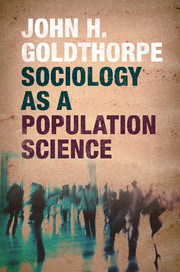Book contents
- Frontmatter
- Dedication
- Contents
- Acknowledgements
- Introduction
- 1 Sociology as a population science: the central idea
- 2 Individual variability in human social life
- 3 The individualistic paradigm
- 4 Population regularities as basic explananda
- 5 Statistics, concepts and the objects of sociological study
- 6 Statistics and methods of data collection
- 7 Statistics and methods of data analysis
- 8 The limits of statistics: causal explanation
- 9 Causal explanation through social mechanisms
- Conclusion
- References
- Index
8 - The limits of statistics: causal explanation
Published online by Cambridge University Press: 05 December 2015
- Frontmatter
- Dedication
- Contents
- Acknowledgements
- Introduction
- 1 Sociology as a population science: the central idea
- 2 Individual variability in human social life
- 3 The individualistic paradigm
- 4 Population regularities as basic explananda
- 5 Statistics, concepts and the objects of sociological study
- 6 Statistics and methods of data collection
- 7 Statistics and methods of data analysis
- 8 The limits of statistics: causal explanation
- 9 Causal explanation through social mechanisms
- Conclusion
- References
- Index
Summary
While statistically informed methods of data collection and analysis are foundational in establishing the probabilistic population regularities that constitute sociological explananda, statistical analysis alone cannot lead to causal explanations of these regularities.
In preceding chapters, the emphasis has been on the crucial part played by statistically informed methods of data collection and analysis in forming the objects of study – the proper explananda – of sociology as a population science: that is, probabilistic population regularities. Such methods would appear essential – no viable alternative to them has been demonstrated – as the means of accommodating the variability of human social life, while at the same time enabling regularities within it to be discovered and adequately described. In the present chapter, however, the emphasis changes. It now falls on what statistical methodology by itself cannot achieve within sociology, and should not be expected to achieve: that is, the provision of causal explanations of the regularities that this methodology serves to establish. Dudley Duncan (1992: 668) once spoke of sociology's ‘Faustian bargain’ with statistics; it is some aspects of the darker side of this bargain that have now to be considered.
As noted in Chapter 7, in early applications of multivariate data analysis in sociology it was often supposed that such analyses could not only reveal various regularities of association in social data but also lead to the demonstration of causal relationships. In particular, forms of regression analysis, culminating in causal path modelling, were seen as the prime means of moving from association to causation. However, over recent decades this view has become subject to increasing doubts and criticism from within statistics and sociology alike, and it would by now appear to receive rather little overt support. At most, it might be claimed that regression analyses allow for a ‘causal interpretation’.
From the side of statistics, perhaps the most telling interventions have been those of David Freedman (1991, 1992, 1997, 2010). Freedman explicitly rejects the idea that causal relationships can, in any field of research, be cranked out of data on the basis of statistical technique alone. Thus, in the case of regression, he stresses that if a regression model is to be appropriately specified for purposes of causal explanation, a prior subject-matter input is always required regarding the processes by which the data under analysis have actually been generated.
- Type
- Chapter
- Information
- Sociology as a Population Science , pp. 99 - 111Publisher: Cambridge University PressPrint publication year: 2015



